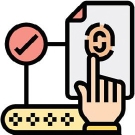JUST THE FACTS : FIVE STEPS FOR TACKLING MEDICAL PAPERWORK LIKE A DETECTIVE
Thinking of myself as a health care detective who is solving a mystery, makes a frustrating process feel a little bit more interesting. You have to figure out the motive, gather the evidence, interrogate the suspects, and put together a case. Every health care paperwork problem is slightly different, so any advice on how to solve these problems has to be broad. But if you can think like a detective, you too can solve medical billing mysteries. Here are my five steps for tackling medical paperwork like a detective:

1. MOTIVE MATTERS
To figure out how to fix a medical bill, you have to figure out why the bill exists. Providers are trying to get paid for the care they've already provided – that's their motive. Insurance companies and Medi-Cal (California's version of Medicaid) managed care plans have conflicted motives. At first glance, it might seem like they're trying not to pay claims to save themselves money. But on an individual case level, it's more likely they're not paying the claim because the paperwork isn't quite right. Never attribute to malice what can be adequately explained by bureaucracy. The people denying the claim don't personally profit off of not paying your claim, they often just need someone to send them information that they don't have yet.

2. GATHER AND EXAMINE THE EVIDENCE
This means sitting down at the kitchen table and spreading out all the paperwork you can find, related to the bill. When you receive a health care bill, you can match the information on the bill to the claim that was (hopefully) filed with your insurance company. If you're being asked to pay, it's a bill. If the insurance company is being asked to pay, it's a claim. If a claim wasn't filed it can be an easy fix, just call the number on the bill and make sure the agency sending the bill has your correct insurance information. If you have private insurance, every claim that is filed generates an explanation of benefits (a document that explains what insurance is going to cover). You can usually access this through your insurance company's online portal, or you can choose to have them mailed to you. If you have Medi-Cal, you'll receive a different document called a notice of action for any claim that is denied, but you generally won't receive anything if the claim is paid.
As you scour the evidence, keep in mind, if you have private insurance, you are generally responsible for copays, deductibles and coinsurance for covered, in-network services. Every policy is different, so you'll need to look at the rules for your specific policy. The explanation of benefits paperwork will tell you why you are being asked to pay. If you're confused by their reasons, you can call and ask for more details. If you understand their reasons but you still disagree, you can file an appeal.

3. INTERROGATE THE SUSPECTS
Once you've examined the evidence, you'll probably have an idea of why the bill hasn't been paid, but you'll need to confirm your theory. In order to solve the mystery, you're going to have to interrogate the suspects and try to get a confession. There are a lot of suspects: Separate bills can come from hospitals, doctors and laboratories for things that happened at the same visit. In California, the bills could legally be the responsibility of private insurance, Medi-Cal or California Children's Services. They're all going to blame the problem on each other. Use this to your advantage. For example, if you suspect the insurance company ignored a fax sent over by the doctor's office, instead of accusing them of doing this, use your best customer service voice to ask if they can check to make sure the doctor's office actually sent the fax. In the end, all you need the insurance company to do is admit that they got the fax, by giving them the option of blaming someone else for the mistake, and you get the problem solved.

4. MAKE YOUR CASE
To resolve your claim, you have to put all the information together and make your case. The provider may have submitted their claim wrong or sent it to the wrong agency. Children with medically complex conditions frequently have multiple agencies covering their care – private insurance, Medi-Cal, California Children's Services and Regional Centers are all potentially responsible for a bill in California. Sometimes the problem is that the agencies were billed in the wrong order. For example, if Medi-Cal is the secondary insurance, then private insurance needs to either pay or deny the claim first. Sometimes the problem is that two agencies – commonly here: Medi-Cal and California Children's Services – each say that the other agency is responsible for the bill. Once you've figured out where the claim went wrong, you can usually find a way to fix it either by making some phone calls or filing an appeal. The appeal can be intimidating — but when you're a health care detective you're not intimidated by paperwork.